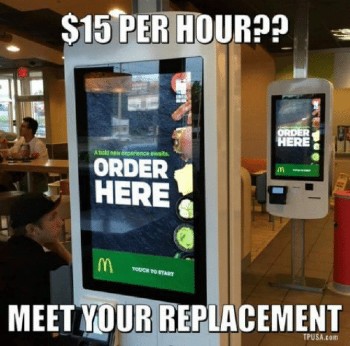We ask you, urgently: don't scroll past this
Dear readers, Catholic Online was de-platformed by Shopify for our pro-life beliefs. They shut down our Catholic Online, Catholic Online School, Prayer Candles, and Catholic Online Learning Resources essential faith tools serving over 1.4 million students and millions of families worldwide. Our founders, now in their 70's, just gave their entire life savings to protect this mission. But fewer than 2% of readers donate. If everyone gave just $5, the cost of a coffee, we could rebuild stronger and keep Catholic education free for all. Stand with us in faith. Thank you.Help Now >
Businesses beware! The IRS will tax robots too
FREE Catholic Classes
Businesses looking to robots to automate labor might have to think again, the IRS wants a cut.

A popular meme suggests rising wages are the cause of automation, but in reality automation is inevitable.
Highlights
Catholic Online (https://www.catholic.org)
8/26/2019 (6 years ago)
Published in Business & Economics
Keywords: Business, automation, taxes
LOS ANGELES, CA (California Network) - Businesses seeking to avoid the rising costs of wages and other expenses related to human employment are looking to robots. One popular meme shows a fast-food kiosk, with the caption, "$15 an hour? Meet your replacement."
However, the federal government, faced with rising Social Security costs among other services, is planning to tax robots which automate work. The reason is, the government needs to make up for the losses of payroll taxes from the private sector.
The New York Post has covered this story and reports, "New 'robot' taxes are expected to multiply in the coming decades as millions of Americans see their jobs automated away." The Post attributes the idea of taxing robots to Bill Gates, who is claims proposed the idea in 2017. In reality, the proposal is much older, as other economists have looked to taxing automation to provide for the unemployed.
Automation cannot be avoided, and estimates of job losses in the United States alone are in the tens of millions over the next decade. Drivers, including big-rig and delivery truck drivers, as well as farm laborers, are facing some of the most serious threats from automation. Earlier this month, UPS reported they have been using automated trucks to deliver cargo between Phoenix and Tuscon since May. Municipalities are already scrambling to accommodate the new technology by approving the use of drones, and setting aside special lanes for autonomous vehicles. Such vehicles, especially trucks, cannot operate so well in the urban environment, but are perfect for point-to-point, highway delivery, where a driver takes over in an urban area. Such vehicles could also be operated remotely, like a drone aircraft, cutting costs even further.
Robots are also at work on farms, and are helping farmers to cut labor costs dramatically. And most Americans are now accustomed to using automated kiosks, tablets, and even their own phones, for goods and services.
Economists recognize that an economic revolution is underway. Previous economic revolutions, such as the development of steam-power, electricity, and computers, have all upset old ways of doing business, causing disruption. However, as people are laid off by disruptions in one sector, they often find a new niche in another. Economic revolutions eliminate some jobs while creating others. However, experts warn this time it will be different. While new job sectors are opening, the need for labor is much less. Even people who repair robots are in some danger of being automated, since some robots can be programmed to repair themselves or one another.
The expected end result is a large segment of humanity without work to do, but that still needs to be fed and clothed. If history is any indicator, this mass of people could pose a danger to society if it feels danger over being left behind.
To keep people pacified, the government will need to tax automation so it can provide for those who can no longer support themselves. The alternative could be violent and unacceptable.
Still, businesses which automate could see a benefit, since robots do not tire, take time off, or demand raises or benefits. They cannot be harassed, create danger, or sue.
Other proposed solutions involve shortening the workweek, introducing mandatory paid vacations, and universal basic income. It is likely a variety of these solutions will be implemented over time, since automation is inescapable.
Businesses should still automate, because even with the taxes, they still come out ahead. As for people, they must find new ways to create value, either by gaining new skills or developing new sectors which cannot be easily automated.
---
'Help Give every Student and Teacher FREE resources for a world-class Moral Catholic Education'
Copyright 2021 - Distributed by Catholic Online
Join the Movement
When you sign up below, you don't just join an email list - you're joining an entire movement for Free world class Catholic education.
- Advent / Christmas
- 7 Morning Prayers
- Mysteries of the Rosary
- Litany of the Bl. Virgin Mary
- Popular Saints
- Popular Prayers
- Female Saints
- Saint Feast Days by Month
- Stations of the Cross
- St. Francis of Assisi
- St. Michael the Archangel
- The Apostles' Creed
- Unfailing Prayer to St. Anthony
- Pray the Rosary
![]()
Copyright 2026 Catholic Online. All materials contained on this site, whether written, audible or visual are the exclusive property of Catholic Online and are protected under U.S. and International copyright laws, © Copyright 2026 Catholic Online. Any unauthorized use, without prior written consent of Catholic Online is strictly forbidden and prohibited.
Catholic Online is a Project of Your Catholic Voice Foundation, a Not-for-Profit Corporation. Your Catholic Voice Foundation has been granted a recognition of tax exemption under Section 501(c)(3) of the Internal Revenue Code. Federal Tax Identification Number: 81-0596847. Your gift is tax-deductible as allowed by law.








